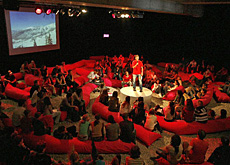
Weapons ban wins support among young Swiss

A national youth assembly has called for an outright ban on firearms in Swiss households.
The demand was one in a series of petitions approved by the 15th Youth Session held in the mountain resort of Laax in southeastern Switzerland on behalf of the federal parliament.
The petition, which won a majority of the 180 representatives in Monday’s plenary session, wants to outlaw firearms, including army weapons, in private homes. The text says the arms pose a risk since it is not it safe to store them in households.
Rolf Heuberger, president of the youth assembly, described the demand at a news conference as “radical”.
It coincides with an ongoing debate in the Swiss parliament, currently sitting in the nearby mountain resort of Flims, and a public controversy over the storage of firearms. Last month a women’s magazine handed in more than 17,000 signatures for a similar petition.
The youth assembly also endorsed several other petitions, notably measures to combat youth unemployment, and exchange programmes for young foreigners to take part in Swiss sports courses.
In another move the meeting called for an eight per cent increase in public spending for education and research.
The petitions were handed over to the speaker of the Swiss House of Representatives, Claude Janiak, in Laax.
“I can’t tell you whether your demands will be heard, but as you may gather the chances of the weapons ban are not very high,” Janiak told the assembly.
Long way
Last month the government said family tragedies and suicides are not valid reasons to stop soldiers from keeping their army weapons at home.
Defence Minister Samuel Schmid argued that Switzerland’s militia army needed to be able to mobilise rapidly, “for example to protect airports and railway stations quickly”.
Also, the Senate recently said it needed time to look into a motion proposed by Anita Fetz, a senator from the centre-left Social Democratic Party, calling for army ammunition to be kept in military storage as opposed to at home. No date was set for any decisions on the motion.
But Janiak encouraged the participants to fight for their causes even if it can take up to ten years to reach a political goal.
“Petitions are one way of drawing public attention. You need a lot of patience in politics, sometimes up to ten years for a new law. That’s the price we have to pay for sustainability in the Swiss system,” Janiak added.
Highlights
The three-day session in Laax was the 15th national assembly of young Swiss from across the country and several representatives of the Swiss Abroad community.
“One of the highlights for me was the plenary session,” says law student Miriam Guimé from Coimbra, Portugal.
“All the participants joined in the debates and we approved petitions on burning issues. It goes to show that we’re not a generation of idiots,” she told swissinfo.
Christoph Musy, project manager of the youth assembly, says the main aim of the meeting is to encourage young Swiss to take an active role in politics and to ensure their voice is heard.
“After 15 years it is also time for a few changes to the routine of the youth assemblies. We want to approach the business community and civil society,” said Musy.
Organisers are also considering plans to convene the regular youth assembly side by side with the autumn session of parliament, instead of a date in November.
This could help ensure that the young people have an easier access to parliament and their specific interests are better heard by the politicians, according to Musy.
swissinfo, Urs Geiser in Laax
The first youth session was organised in 1991 to coincide with the 700th anniversary of the founding of Switzerland.
The meeting in Laax was the first outside the capital, Bern, and the 15th in the history of the national youth assemblies, which are organised by the Swiss council for youth activities.
About 200 people aged 14-21 took part in a series of working groups, activities and a plenary session in Laax over the past weekend.

In compliance with the JTI standards
More: SWI swissinfo.ch certified by the Journalism Trust Initiative





























You can find an overview of ongoing debates with our journalists here . Please join us!
If you want to start a conversation about a topic raised in this article or want to report factual errors, email us at english@swissinfo.ch.